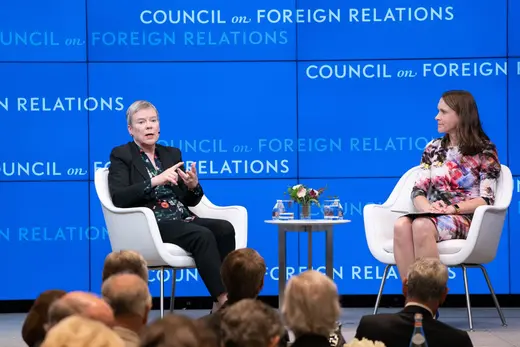International Affairs Fellowship
The IAF program has produced 650 alumni who constitute a who’s who of the U.S. foreign policy community, including a former secretary, several undersecretaries of state, and ambassadors.
The Program
Established in 1967, the International Affairs Fellowship (IAF) aims to bridge the gap between the study and making of U.S. foreign policy by creating the next generation of scholar-practitioners. The program offers fellows the chance to experience a new environment and gain a different perspective at a pivotal moment in their careers. Academics are placed in policy-oriented public service settings and government officials in scholarly settings. The IAF program now has more than 650 alumni, constituting a who’s who of the U.S. foreign policy community, including a former secretary of state, several undersecretaries of state and defense, ambassadors, and many other influential leaders in government, academia, and the private sector.
Hear From Past International Affairs Fellows
“We see the folks that really have a huge impact on the conversations that we are having, the questions that we are asking, and the direction that we are headed,” says historian Melissa Jane Taylor about her experience as a Council on Foreign Relations International Affairs Fellow. Described as the “Jewel of the Council,” the International Affairs Fellowship (IAF) programs aim to bridge scholarship and practice by giving participants transformative opportunities to work in a new environment they will give them a different perspective at a critical point in their careers. Whether at home in the United States or abroad in Canada, Europe, Indonesia, and Japan, fellows work in government, international organizations, and think tanks and universities. Join the more than 650 alumni—including Condoleezza Rice and Samantha Power—in shaping the field of foreign policy and the world.
Eligibility
- Applicants must be U.S. citizens.
- Applicants must be mid-career professionals.
- Applicants must have a strong record of professional achievement and a firm grounding in the field of foreign policy.
- Applicants must hold at least a bachelor’s degree or equivalent.
A PhD is not required for university-based applicants, though successful candidates from academia typically hold an advanced degree. The program does not fund pre- or postdoctoral research, work toward a degree, or the completion of projects on which substantial progress has been made before the fellowship begins. For candidates from academia and the private sector looking to go into government, preference is given to candidates with no significant work experience in the U.S. government or at an international organization.
If it had not been for my experience as an IAF, I would not have been able to negotiate the New START Treaty. Working on START I in Geneva with negotiators Linton Brooks and Rick Burt and their teams was a formative experience, one I never forgot.
Fellowship Award
The fellowship runs for twelve months, preferably starting in September. The fellowship stipend is $120,000 for a period of twelve months. Fellows are independent contractors rather than employees of CFR and are not eligible for employment benefits, including health insurance.
CFR will assist fellows in finding a suitable placement for their fellowship year. However, all placements are made at the discretion of the host institution. CFR cannot guarantee placement at any particular agency, office, or organization. The fellowship is intended as an in-person experience; fellows should expect to work on-site with their host organization or agency at least three days per week.
Fellows seeking to spend their fellowship working at a U.S. government agency likely will need to obtain a security clearance. The process for obtaining a security clearance can be lengthy, and the U.S. government alone determines when a clearance can be granted. Because of the time needed to obtain a security clearance, affected fellows need to be flexible about their fellowship start date or be willing to begin their fellowships in a position that does not require a security clearance. Placements at international organizations and on Capitol Hill typically do not require security clearances.
Each year, to ensure that national security remains a focus within the program, two or more awardees whose proposed research focuses on existing or emerging national security threats are given the special designation of International Affairs Fellow in National Security.
If given the rare opportunity to have an experience that redefines your career trajectory ... take it! That’s what my IAF did for me!
Selection Process
Selection as an IAF is based on the following criteria:
- scholarly qualifications
- professional experience
- a demonstrated interest in foreign policy
- the merits and feasibility of a proposal on some aspect of U.S. foreign policy
- the contribution the fellowship will make to the applicant’s career development
The selection process is highly competitive. A selection committee reviews all applications and selects twenty applicants for interviews. The selection committee typically awards eight to ten fellowships each year. Strong preference is given to candidates who have never received a CFR fellowship.
How to Apply
Interested candidates who meet the program’s eligibility requirements can apply online between August 15 and October 31, 2024, for the 2025–26 fellowship cycle.
2023–24 Fellows
Affiliations at the time of the award

Creator & CEO, LinaAbiRafeh.com

Senior Policy Analyst, NASA

Visiting Scholar, Boston College

Director, Strategic Policy Analysis, In-Q-Tel

Country Representative to Ethiopia, U.S. Agency for International Development Office of Transition Initiatives

Partner, Mayer Brown LLP

Evacuation and Security Consultant, Vital Voices Global Partnership

Concept Writer, U.S. Army Futures Command

Deputy U.S. Special Envoy for Yemen, U.S. Department of State

Planning Officer, United Nations Integrated Office in Haiti

Associate Professor, Georgia Institute of Technology
* International Affairs Fellow in National Security
Alumni
The complete list of former International Affairs Fellows is available here.
Contact Us
For more information, please contact [email protected]
 Online Store
Online Store
